Unit 1 How can we become good learners.Section A(2a-2d)课件(共34张PPT)
文档属性
| 名称 | Unit 1 How can we become good learners.Section A(2a-2d)课件(共34张PPT) | 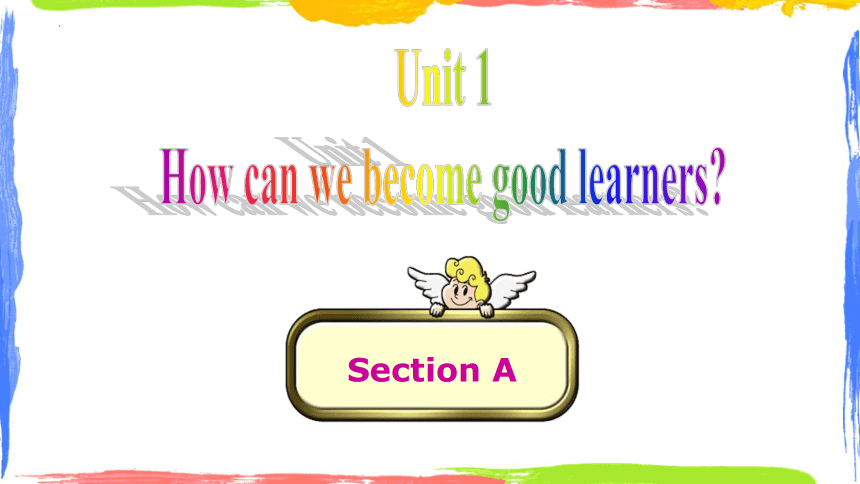 | |
| 格式 | zip | ||
| 文件大小 | 1.9MB | ||
| 资源类型 | 教案 | ||
| 版本资源 | 人教新目标(Go for it)版 | ||
| 科目 | 英语 | ||
| 更新时间 | 2022-07-19 22:28:20 | ||
图片预览

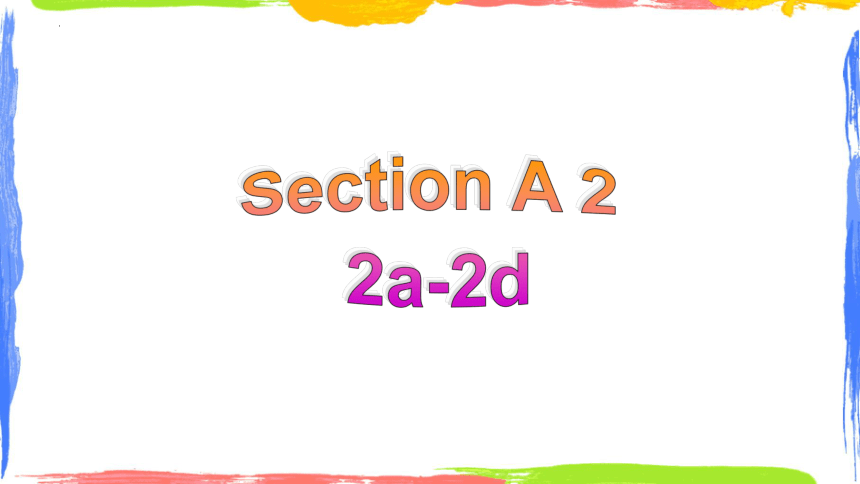

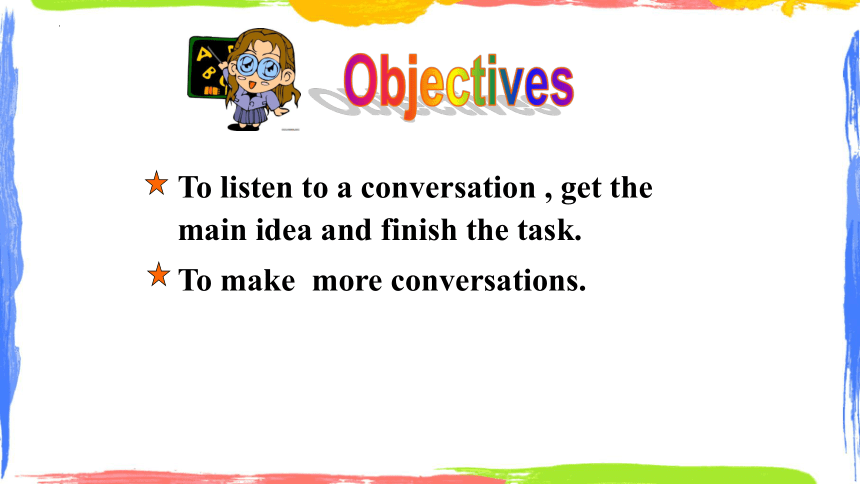
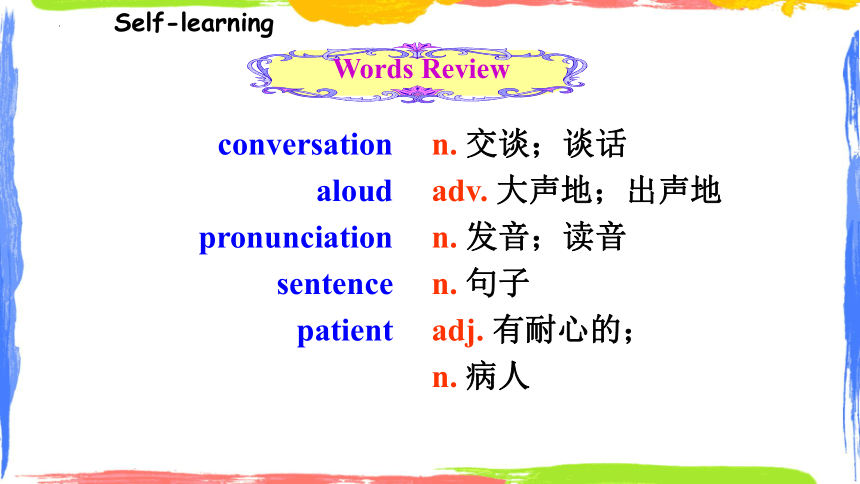

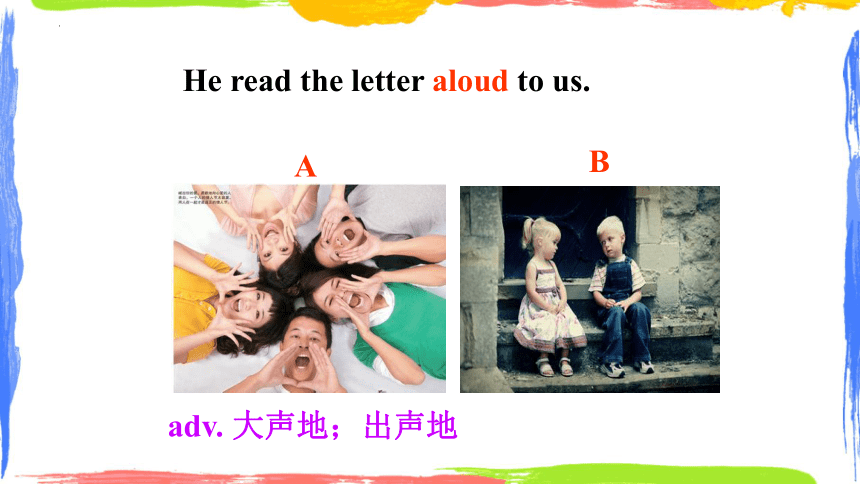
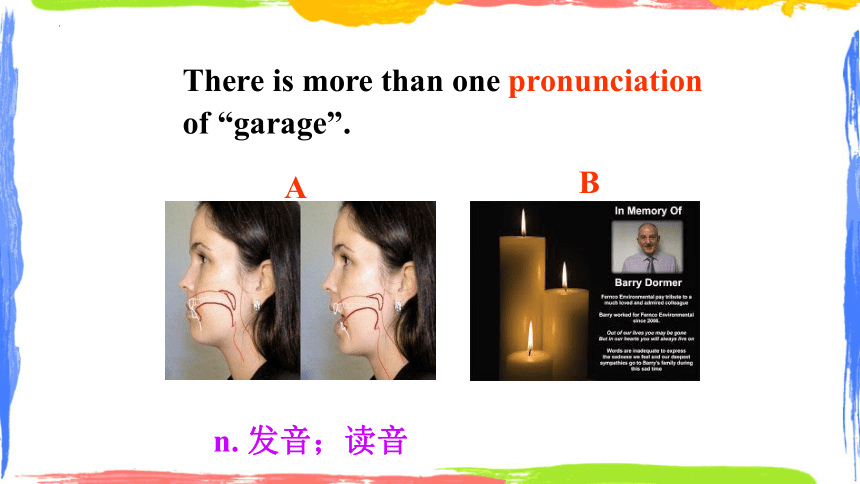
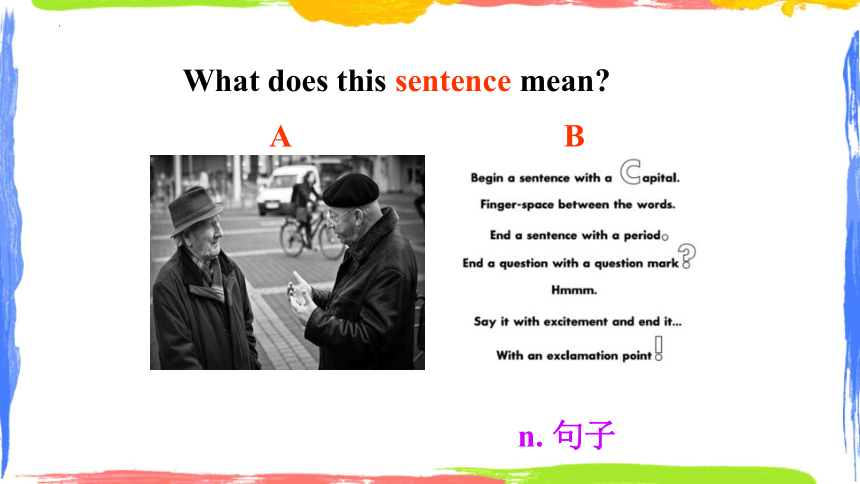
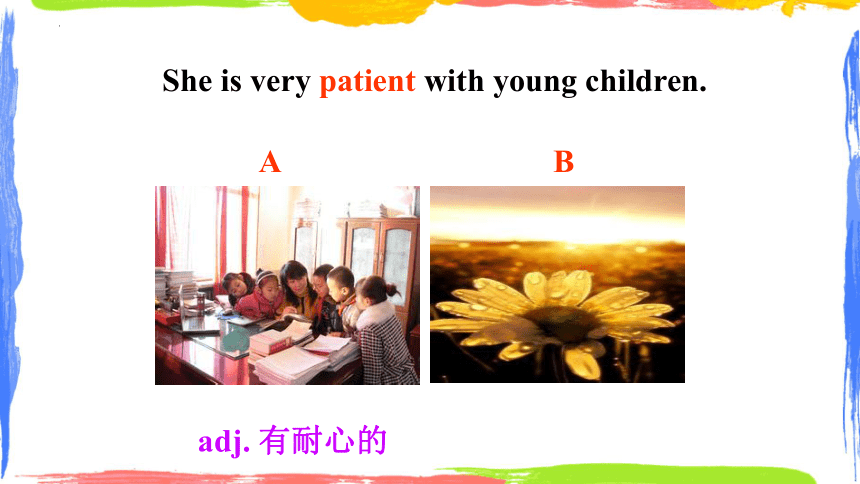
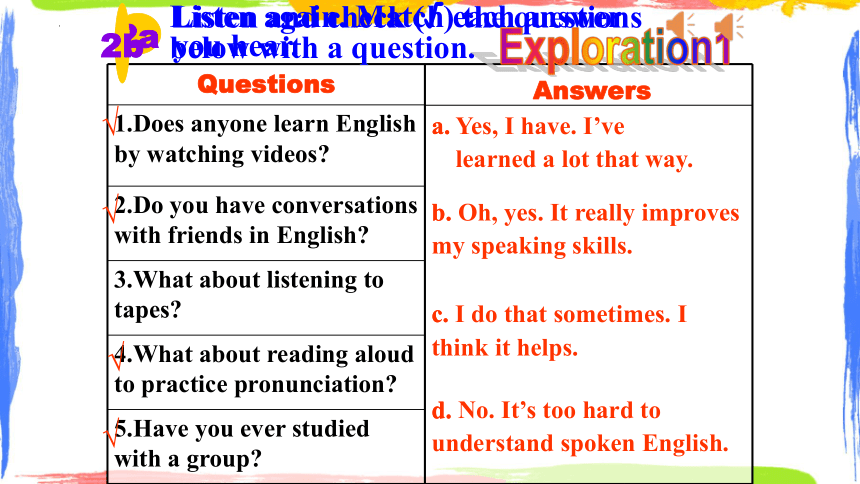
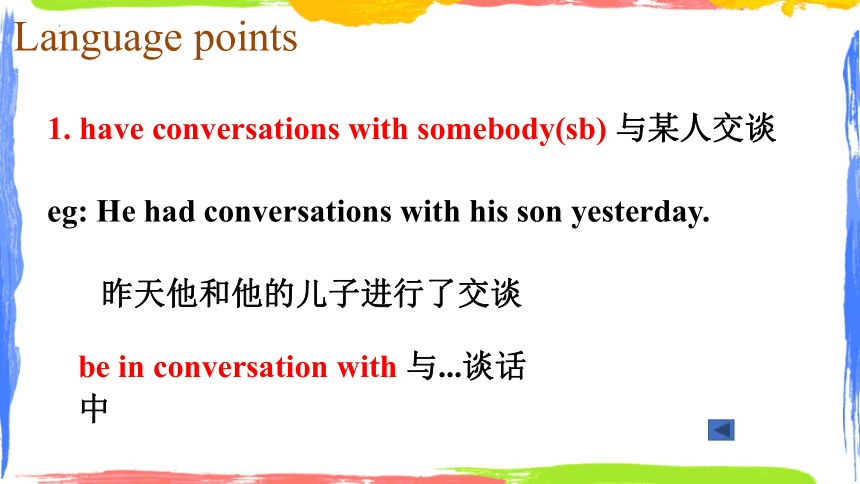
文档简介
(共34张PPT)
Unit 1
How can we become good learners
Section A
Section A 2
2a-2d
How do you study for a test
I study by…
keeping English
diaries
speaking English
in class
reading English
books、magazines
&newspapers
watching English films
reading English newspaper
Lead-in
Objectives
To listen to a conversation , get the main idea and finish the task.
To make more conversations.
conversation
aloud
pronunciation
sentence
patient
n. 交谈;谈话
adv. 大声地;出声地
n. 发音;读音
n. 句子
adj. 有耐心的;
n. 病人
Words Review
Self-learning
I had a long conversation with her the other day.
n. 交谈;谈话
A
B
Check
He read the letter aloud to us.
adv. 大声地;出声地
A
B
There is more than one pronunciation of “garage”.
n. 发音;读音
A
B
What does this sentence mean
n. 句子
A
B
She is very patient with young children.
adj. 有耐心的
A
B
2a
Listen and check (√) the questions you hear.
Questions
1.Does anyone learn English by watching videos
2.Do you have conversations with friends in English
3.What about listening to tapes
4.What about reading aloud to practice pronunciation
5.Have you ever studied with a group
2b
Listen again. Match each answer below with a question.
Answers
Yes, I have. I’ve learned a lot that way.
d. No. It’s too hard to understand spoken English.
b. Oh, yes. It really improves my speaking skills.
c. I do that sometimes. I think it helps.
a.
b.
c.
d.
√
√
√
√
Exploration1
1. have conversations with somebody(sb) 与某人交谈
eg: He had conversations with his son yesterday.
昨天他和他的儿子进行了交谈
be in conversation with 与...谈话中
Language points
2. What about reading aloud to practice
pronunciation
大声朗读来练习发音怎么样?
辨析aloud, loud和loudly
aloud 出声地; 大声地。常与read/ call/shout/cry等词连用, 不用于比较级。
e.g. 不要在图书馆大声朗读。
Don’t read aloud in the library.
loud 大声地; 喧闹地。指说话声和笑声,
常与talk/ speak/ laugh/ sing等词连用,
常用比较级。
e.g. 我们听不到你的声音, 请再大声点。
We can’t hear you. Please speak louder.
loudly 高声地; 喧闹地。含有“吵闹”的意思, 不悦耳,常和knock/ring连用。
What about/ How about…
后跟名词, 代词或v.-ing。用于征求意见。
e.g. 喝杯茶怎么样?
你呢?
今天下午去动物园怎么样?
What about drinking a cup of tea
How about you
What /How about going to the zoo this afternoon
3. It’s too hard to understand spoken English.
句中的it是形式主语, 不定式短语to
understand spoken English是真正的主
语, too修饰形容词hard。该句句型为:
It’s+(too)+adj.+ (for sb.)+to do sth. 意思是“(对某人来说)做某事是……的”。
Have you ever studied with a group
Make conversations
using the information in 2a and 2b.
Pairwork
2c
Yes, I have. I’ve learned a lot that way.
Jack: Annie, I’m a little _______. I have to finish _____________ and give a next ______ Monday.
Annie: That doesn’t ____________.
Jack: But I’m a very __________.
Annie: Just ___________ to get the _____
_____ at first. Don’t read ________
_____. Read ___________.
Listen and finish the conversation.
2d
nervous
reading a book
report
sound too bad
slow reader
read quickly
main
ideas
word by
word
word groups
Jack: But I don’t understand many of the
words. I have to ______________.
Annie: Try to guess a word’s meaning ___
_______ sentences before and after
it. You probably understand more than
you think.
Jack: ___________________!
Annie: Well, be patient. ___________. You can
become better ____________________
________ every day. _________ you
read, _________ you’ll be.
n. 句子
adj. 耐心的;n. 病人
use a dictionary
reading
by
That sounds difficult
It takes time
by reading something
you enjoy
the faster
The more
1. I study by working with a group.
我通过小组活动来学习。
by作为介词,用法很多。请仔细观察
下面的例句,分析by的用法,然后补全结论部分所缺的内容。
Exploration 2
Language points
【例句】
1. Come and sit by us.
2. Peter goes to work by bus every day.
3. Tony will come back by 10:00 pm.
4. English is spoken by lots of people.
5. My brother studies history by working with a group.
【结论】
1. by可表示位置,(1) “__________”,如句1。也有“从……旁边(经过)”之意。
2. by可表示交通、传递等的方式,如句2。
3. by可表示时间,“到(某时)之前; 不迟于”,如句3。
4. by可用于构成(2) ________,“被, 由”,如句4。
5. by可表示方式或手段,(3) “____________”结构在句中作方式状语,“通过……方式(方法)”或“借助……手段”,如句5。
在……旁边
被动语态
by+v.-ing形式
【运用】
根据提示,用含有by的短语完成句子。
1. Annie went to Beijing ________
(乘火车) yesterday.
2. His grandfather made a living ________
_____ (靠卖水果) in the past.
by train
by selling
fruits
3. The scientists have to arrive at the
village _________ (八月以前).
4. Allen goes _______________ (经过邮局) on his way to school every morning.
5. The book was written __ _______ ________ (由几个工程师).
by August
by the post office
by several engineers
4. Don’t read word by word, read word
groups.
句中的word by word意思是“逐字地”,by表示速率。如:day by day意为“一天天地”,step by step意为“逐步地”。
【运用】完成英语句子,每空一词。
1) 他们逐句地讨论这个报告。
They discussed the report
_______ __ _______.
sentence by sentence
2) 学生们一个个地出去了。
The students went out ___ __ ___.
one by one
5. Well, be patient.
adj. “有耐心的”,作定语或表语。
e.g. Dave is a patient person.
You’ll just have to be patient.
be patient with sb. “对某人有耐心”。
e.g. She’s very patient with young children.
n. “病人”
e.g. Several patients are waiting to see the
doctor.
【运用】
Ⅰ. 选出下列句子中patient的含义。
A. 病人 B. 有耐心的
( ) 1) Just be patient. I think you’re next.
( ) 2) He is a patient now. We should take
good care of him.
Ⅱ. 将下面的句子翻译成英语。
我们英语老师对每个学生都有耐心。
__________________________________
__________________________________
A
B
Our English teacher is patient with
every student.
6. The more you read, the faster you’ll be.
“the+比较级+ ..., the +比较级+ ...”表示
“越……,就越……”。
e.g. The warmer the weather is, the better I
will feel.
【运用】根据汉语意思完成英语句子。
你练习得越多,就写得越好。
_________ you practice, ________ you’ll write.
The more the better
What/ How about+ V. ing…
Dose/ Do sb. + V. ….
Have you + V. (P.P.)…
Yes, I have.
No, I haven’t.
Summary
Ⅰ. Choose the best answer.
1. He goes to school ____ bike.
A. by B. on C. in D. at
2. — How do you study English so well
— By ____ lots of books.
A. read B. look
C. watching D. reading
Ⅱ. Complete the following sentences.
1. 大声朗读来练习发音怎么样?
What about ____________ to practice
pronunciation
2. 她通过读课本来学习英语。
She studies English __________ the
textbook.
3. She improves her English ____________
___________ (通过加入英语俱乐部).
reading aloud
by reading
by joining an English club
Ⅲ. Translation.
1. 老师要求我大声朗读课文。
2. 不要这么大声。婴儿在睡觉。
3. 我爸爸经常开车去上班。
The teacher asked me to read aloud the text.
Don’t talk so loudly. The baby is sleeping.
My father often goes to work by car.
1. Role-play the coversation with your partner.
2. Finish the exercises in Ss' book.
Unit 1
How can we become good learners
Section A
Section A 2
2a-2d
How do you study for a test
I study by…
keeping English
diaries
speaking English
in class
reading English
books、magazines
&newspapers
watching English films
reading English newspaper
Lead-in
Objectives
To listen to a conversation , get the main idea and finish the task.
To make more conversations.
conversation
aloud
pronunciation
sentence
patient
n. 交谈;谈话
adv. 大声地;出声地
n. 发音;读音
n. 句子
adj. 有耐心的;
n. 病人
Words Review
Self-learning
I had a long conversation with her the other day.
n. 交谈;谈话
A
B
Check
He read the letter aloud to us.
adv. 大声地;出声地
A
B
There is more than one pronunciation of “garage”.
n. 发音;读音
A
B
What does this sentence mean
n. 句子
A
B
She is very patient with young children.
adj. 有耐心的
A
B
2a
Listen and check (√) the questions you hear.
Questions
1.Does anyone learn English by watching videos
2.Do you have conversations with friends in English
3.What about listening to tapes
4.What about reading aloud to practice pronunciation
5.Have you ever studied with a group
2b
Listen again. Match each answer below with a question.
Answers
Yes, I have. I’ve learned a lot that way.
d. No. It’s too hard to understand spoken English.
b. Oh, yes. It really improves my speaking skills.
c. I do that sometimes. I think it helps.
a.
b.
c.
d.
√
√
√
√
Exploration1
1. have conversations with somebody(sb) 与某人交谈
eg: He had conversations with his son yesterday.
昨天他和他的儿子进行了交谈
be in conversation with 与...谈话中
Language points
2. What about reading aloud to practice
pronunciation
大声朗读来练习发音怎么样?
辨析aloud, loud和loudly
aloud 出声地; 大声地。常与read/ call/shout/cry等词连用, 不用于比较级。
e.g. 不要在图书馆大声朗读。
Don’t read aloud in the library.
loud 大声地; 喧闹地。指说话声和笑声,
常与talk/ speak/ laugh/ sing等词连用,
常用比较级。
e.g. 我们听不到你的声音, 请再大声点。
We can’t hear you. Please speak louder.
loudly 高声地; 喧闹地。含有“吵闹”的意思, 不悦耳,常和knock/ring连用。
What about/ How about…
后跟名词, 代词或v.-ing。用于征求意见。
e.g. 喝杯茶怎么样?
你呢?
今天下午去动物园怎么样?
What about drinking a cup of tea
How about you
What /How about going to the zoo this afternoon
3. It’s too hard to understand spoken English.
句中的it是形式主语, 不定式短语to
understand spoken English是真正的主
语, too修饰形容词hard。该句句型为:
It’s+(too)+adj.+ (for sb.)+to do sth. 意思是“(对某人来说)做某事是……的”。
Have you ever studied with a group
Make conversations
using the information in 2a and 2b.
Pairwork
2c
Yes, I have. I’ve learned a lot that way.
Jack: Annie, I’m a little _______. I have to finish _____________ and give a next ______ Monday.
Annie: That doesn’t ____________.
Jack: But I’m a very __________.
Annie: Just ___________ to get the _____
_____ at first. Don’t read ________
_____. Read ___________.
Listen and finish the conversation.
2d
nervous
reading a book
report
sound too bad
slow reader
read quickly
main
ideas
word by
word
word groups
Jack: But I don’t understand many of the
words. I have to ______________.
Annie: Try to guess a word’s meaning ___
_______ sentences before and after
it. You probably understand more than
you think.
Jack: ___________________!
Annie: Well, be patient. ___________. You can
become better ____________________
________ every day. _________ you
read, _________ you’ll be.
n. 句子
adj. 耐心的;n. 病人
use a dictionary
reading
by
That sounds difficult
It takes time
by reading something
you enjoy
the faster
The more
1. I study by working with a group.
我通过小组活动来学习。
by作为介词,用法很多。请仔细观察
下面的例句,分析by的用法,然后补全结论部分所缺的内容。
Exploration 2
Language points
【例句】
1. Come and sit by us.
2. Peter goes to work by bus every day.
3. Tony will come back by 10:00 pm.
4. English is spoken by lots of people.
5. My brother studies history by working with a group.
【结论】
1. by可表示位置,(1) “__________”,如句1。也有“从……旁边(经过)”之意。
2. by可表示交通、传递等的方式,如句2。
3. by可表示时间,“到(某时)之前; 不迟于”,如句3。
4. by可用于构成(2) ________,“被, 由”,如句4。
5. by可表示方式或手段,(3) “____________”结构在句中作方式状语,“通过……方式(方法)”或“借助……手段”,如句5。
在……旁边
被动语态
by+v.-ing形式
【运用】
根据提示,用含有by的短语完成句子。
1. Annie went to Beijing ________
(乘火车) yesterday.
2. His grandfather made a living ________
_____ (靠卖水果) in the past.
by train
by selling
fruits
3. The scientists have to arrive at the
village _________ (八月以前).
4. Allen goes _______________ (经过邮局) on his way to school every morning.
5. The book was written __ _______ ________ (由几个工程师).
by August
by the post office
by several engineers
4. Don’t read word by word, read word
groups.
句中的word by word意思是“逐字地”,by表示速率。如:day by day意为“一天天地”,step by step意为“逐步地”。
【运用】完成英语句子,每空一词。
1) 他们逐句地讨论这个报告。
They discussed the report
_______ __ _______.
sentence by sentence
2) 学生们一个个地出去了。
The students went out ___ __ ___.
one by one
5. Well, be patient.
adj. “有耐心的”,作定语或表语。
e.g. Dave is a patient person.
You’ll just have to be patient.
be patient with sb. “对某人有耐心”。
e.g. She’s very patient with young children.
n. “病人”
e.g. Several patients are waiting to see the
doctor.
【运用】
Ⅰ. 选出下列句子中patient的含义。
A. 病人 B. 有耐心的
( ) 1) Just be patient. I think you’re next.
( ) 2) He is a patient now. We should take
good care of him.
Ⅱ. 将下面的句子翻译成英语。
我们英语老师对每个学生都有耐心。
__________________________________
__________________________________
A
B
Our English teacher is patient with
every student.
6. The more you read, the faster you’ll be.
“the+比较级+ ..., the +比较级+ ...”表示
“越……,就越……”。
e.g. The warmer the weather is, the better I
will feel.
【运用】根据汉语意思完成英语句子。
你练习得越多,就写得越好。
_________ you practice, ________ you’ll write.
The more the better
What/ How about+ V. ing…
Dose/ Do sb. + V. ….
Have you + V. (P.P.)…
Yes, I have.
No, I haven’t.
Summary
Ⅰ. Choose the best answer.
1. He goes to school ____ bike.
A. by B. on C. in D. at
2. — How do you study English so well
— By ____ lots of books.
A. read B. look
C. watching D. reading
Ⅱ. Complete the following sentences.
1. 大声朗读来练习发音怎么样?
What about ____________ to practice
pronunciation
2. 她通过读课本来学习英语。
She studies English __________ the
textbook.
3. She improves her English ____________
___________ (通过加入英语俱乐部).
reading aloud
by reading
by joining an English club
Ⅲ. Translation.
1. 老师要求我大声朗读课文。
2. 不要这么大声。婴儿在睡觉。
3. 我爸爸经常开车去上班。
The teacher asked me to read aloud the text.
Don’t talk so loudly. The baby is sleeping.
My father often goes to work by car.
1. Role-play the coversation with your partner.
2. Finish the exercises in Ss' book.
同课章节目录
- Unit 1 How can we become good learners.
- Section A
- Section B
- Unit 2 I think that mooncakes are delicious!
- Section A
- Section B
- Unit 3 Could you please tell me where the restroom
- Section A
- Section B
- Unit 4 I used to be afraid of the dark.
- Section A
- Section B
- Unit 5 What are the shirts made of?
- Section A
- Section B
- Review of Units 1-5
- Unit 6 When was it invented?
- Section A
- Section B
- Unit 7 Teenagers should be allowed to choose their
- Section A
- Section B
- Unit 8 It must belong to Carla.
- Section A
- Section B
- Unit 9 I like music that I can dance to.
- Section A
- Section B
- Unit 10 You're supposed to shake hands.
- Section A
- Section B
- Review of Units 6-10
- Unit 11 Sad movies make me cry.
- Section A
- Section B
- Unit 12 Life is full of the unexpected
- Section A
- Section B
- Unit 13 We're trying to save the earth!
- Section A
- Section B
- Unit 14 I remember meeting all of you in Grade 7.
- Section A
- Section B
- Review of Units 11-14
